人教版(2019)必修第三册Unit2Morals and Virtues单词及重点句式课件.(74张ppt)
文档属性
| 名称 | 人教版(2019)必修第三册Unit2Morals and Virtues单词及重点句式课件.(74张ppt) |  | |
| 格式 | zip | ||
| 文件大小 | 7.7MB | ||
| 资源类型 | 教案 | ||
| 版本资源 | 人教版(2019) | ||
| 科目 | 英语 | ||
| 更新时间 | 2022-05-12 15:00:40 | ||
图片预览

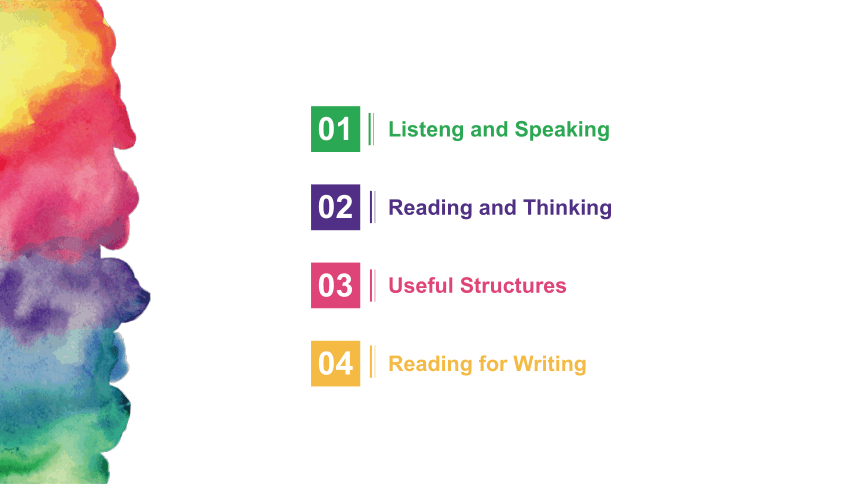



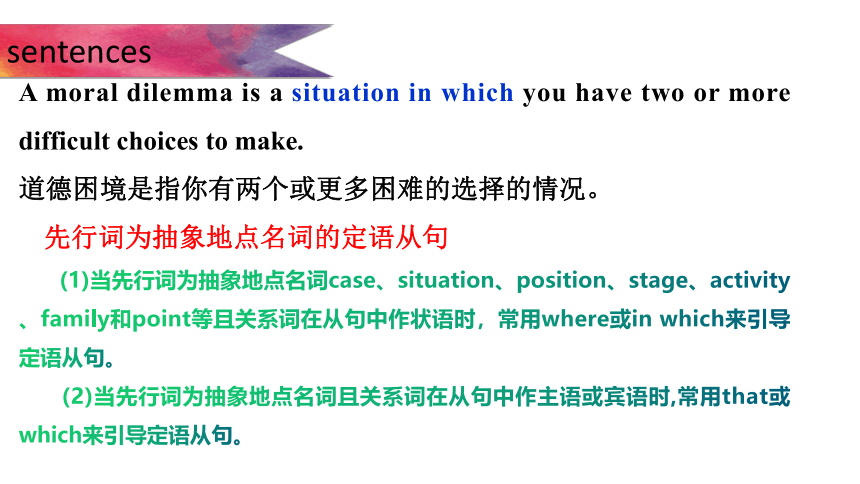
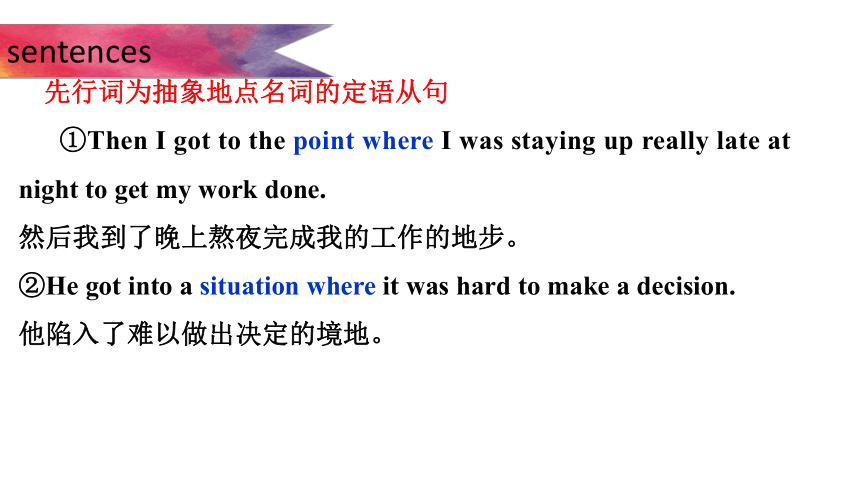
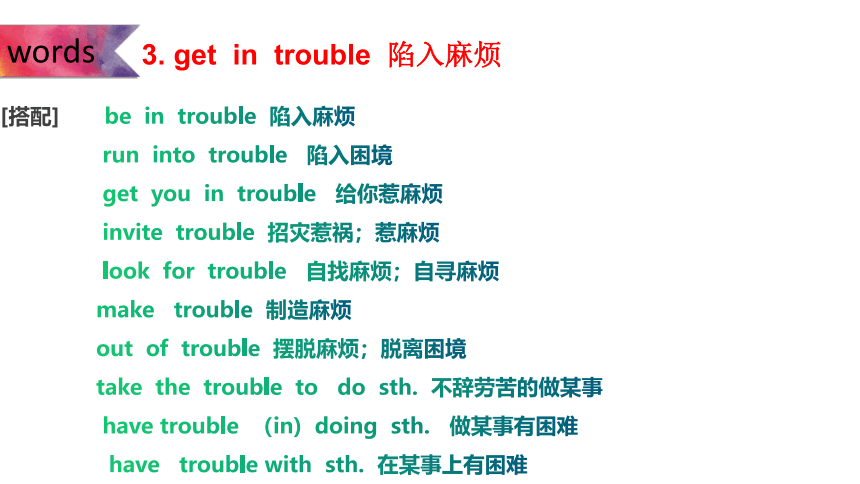

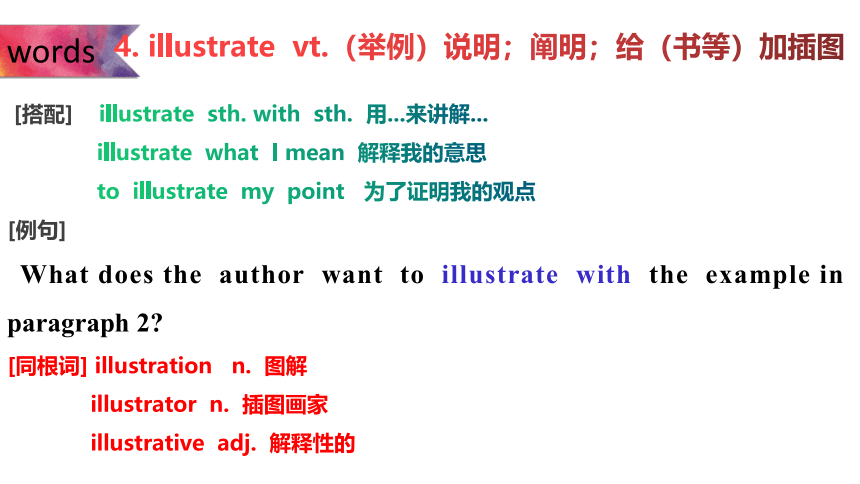
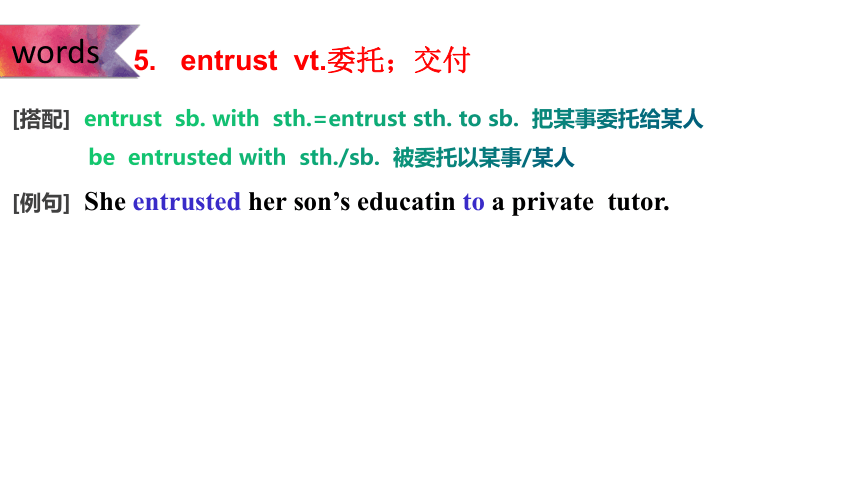
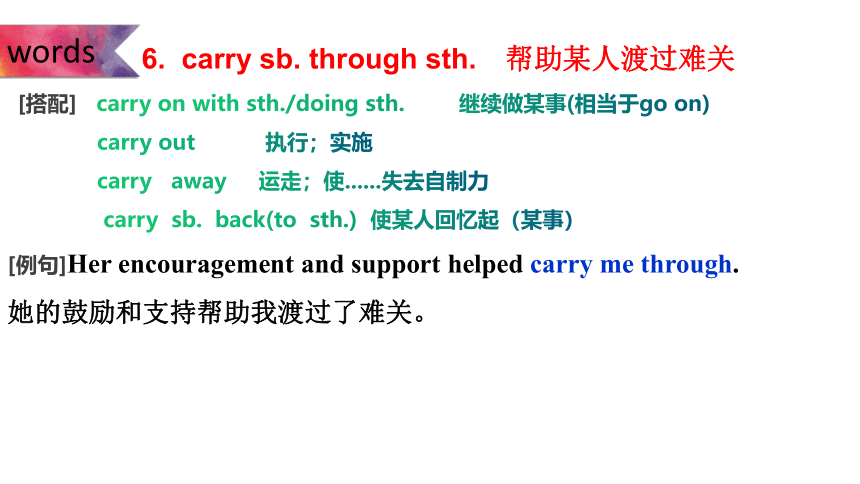
文档简介
(共74张PPT)
u n i t 2
01
02
03
04
Listeng and Speaking
Reading and Thinking
Useful Structures
Reading for Writing
01
PART ONE
Listening and Speaking
1. moral adj. 道德的;道义上的 n. 品行;道德;寓意
words
[同根词] morally adv. 道德上
immoral adj. 不道德的
[搭配] moral dilemma 道德困境
in a dilemma 处于进退两难的境地
face a dilemma 面对进退两难的境地
get out of the dilemma 摆脱困境
[例句]
The doctor was in a dilemma whether he should tell the parents the truth.
医生左右为难,不知该不该告诉这对父母真相。
2.dilemma n.进退两难的境地;困境
words
A moral dilemma is a situation in which you have two or more difficult choices to make.
道德困境是指你有两个或更多困难的选择的情况。
先行词为抽象地点名词的定语从句
(1)当先行词为抽象地点名词case、situation、position、stage、activity、family和point等且关系词在从句中作状语时,常用where或in which来引导定语从句。
(2)当先行词为抽象地点名词且关系词在从句中作主语或宾语时,常用that或which来引导定语从句。
sentences
先行词为抽象地点名词的定语从句
①Then I got to the point where I was staying up really late at night to get my work done.
然后我到了晚上熬夜完成我的工作的地步。
②He got into a situation where it was hard to make a decision.
他陷入了难以做出决定的境地。
sentences
[搭配] be in trouble 陷入麻烦
run into trouble 陷入困境
get you in trouble 给你惹麻烦
invite trouble 招灾惹祸;惹麻烦
look for trouble 自找麻烦;自寻麻烦
make trouble 制造麻烦
out of trouble 摆脱麻烦;脱离困境
take the trouble to do sth. 不辞劳苦的做某事
have trouble (in) doing sth. 做某事有困难
have trouble with sth. 在某事上有困难
3. get in trouble 陷入麻烦
words
02
PART TWO
Reading and Thinking
[搭配] illustrate sth. with sth. 用...来讲解...
illustrate what I mean 解释我的意思
to illustrate my point 为了证明我的观点
[例句]
What does the author want to illustrate with the example in paragraph 2
[同根词] illustration n. 图解
illustrator n. 插图画家
illustrative adj. 解释性的
4. illustrate vt.(举例)说明;阐明;给(书等)加插图
words
[搭配] entrust sb. with sth.=entrust sth. to sb. 把某事委托给某人
be entrusted with sth./sb. 被委托以某事/某人
[例句] She entrusted her son’s educatin to a private tutor.
5. entrust vt.委托;交付
words
[搭配] carry on with sth./doing sth. 继续做某事(相当于go on)
carry out 执行;实施
carry away 运走;使......失去自制力
carry sb. back(to sth.) 使某人回忆起(某事)
[例句]Her encouragement and support helped carry me through.
她的鼓励和支持帮助我渡过了难关。
6. carry sb. through sth. 帮助某人渡过难关
words
[搭配] the majority of... 大多数……
the majority 大众;大多数人
be in the majority 占大部分/大多数
[例句]
When I have a different opinion,I will still respect the opinion of the majority.
当我有不同的观点时,我仍然会尊重大多数人的观点。
[同根词] major v.& n. 主修;专业
major in 主修……;以……为专业
7. majority n.大部分;大多数
words
7. majority n.大部分;大多数
words
(1)the/a majority of+名词, 表示“大多数”, 谓语动词的数与of后面的名词保持一致。
(2)the majority单独作主语时,谓语动词用单数或复数皆可。
[搭配] complain (to sb.) about (doing) sth. (向某人)抱怨(做)某事
complain that... 抱怨……
[例句] Some students complain that they have too much homework to do every day.
一些学生抱怨说他们每天有太多的家庭作业要做。
[同根词] complaint n. 抱怨,投诉
make a complaint (to sb. )about... 投诉/抱怨……
8. complain vi.& vt.抱怨;发牢骚
words
[搭配] respond to... 对……做出答复/回复
[例句] With the help of his teammate, he responded immediately to the accident.
在队友的帮助下,他立即对事故做出了反应。
[同根词] response n. 反应;回答;回复
in response to 回答;响应
make (a) response to... 回答;对……做出回应
make no response to 对......没做回应
There was no response 没有回应
9. respond vt.回答;回复 vi.做出反应;回应
words
10.1 hire vt.聘用;雇佣;租用
[搭配] hire sth. out (短期)出租某物
hire oneself out 受雇
hire sb. to do sth. 雇佣某人做某事
[例句] We hired our bikes from the rental place at the South Gate.
我们在南门的租车处租了自行车
10. hire vt.聘用;雇佣;租用 n. 租借;租用
words
10.2 hire n. 租借;租用
[搭配] boats on/for hire 可供出租的小船
[反义词] fire vt. 开除;解雇
10. hire vt.聘用;雇佣;租用 n. 租借;租用
words
[搭配] reject sb./one's offer 拒绝某人/某人的提议
reject sb. into... 拒绝某人加入
[例句] I make it clear to him that I reject his proposal.
我清楚地告诉他,我拒绝他的建议。
[同根词] rejection n. 拒绝接受;否决
11.reject vt.拒绝接受;不录用
words
[搭配] appoint sb. to sth. 派某人任某职
appoint sb. to do sth. 委派某人做某事
appoint sb. as 任命某人担任
appoint a time 约定时间
[例句] We must appoint an experienced physician as soon as possible. 我们必须尽快任命一位有经验的医生。
[同根词] appointment n. 约会;任命
make/have an appointment with sb. 与某人约会
make an appointment 预约
appointed adj. 约定的,指定的
12.appoint vt.任命;委派
words
[搭配] a faraway look/expression 心不在焉的神情
a war in a faraway country
[例句]
They have just returned from faraway places with wonderful stories to tell.
13. faraway adj. 遥远的;心不在焉的;恍惚的
words
[搭配] elect sb. (as/to be)... 选举某人(为……)
在“elect sb.+职位”句式中,总统、市长等独一无二的职位前不用加任何冠词。
elect to do sth. 选择或决定做某事
[例句]
An increasing number of people elect to work at home.
越来越多的人选择在家工作。
[同根词] election n. 选举;当选;推举
14. elect vt.选举;推选
words
[搭配] tend to do sth. 易于做某事;往往会发生某事
tend to sb./sth. 照顾某人,照料某人/某事
tend towards 有......的趋势,倾向于......
[例句] Some parents tend to do everything for their children.
一些父母会为孩子做一切事情。
[同根词] tendency n. 趋向;倾向(常与to/towards连用)
a tendency to/towards ……的倾向
15. tend vt.照顾;照料 vi.倾向;趋于
words
[搭配] publish in English 用英语出版
publish to the world 公之于世
[同根词] publisher n. 出版人(或机构);发行人(或结构)
16.publish vt. 发表(作品);出版;公布
words
[搭配] retire from... 从……退休
retire as... 以……身份退休
[例句]
He didn't consider going on holiday until he retired from teaching three years ago.
直到三年前他从教学岗位退休,他才考虑去度假。
[同根词] retirement n. 退休;退职;退休生活
retired adj. 退休的
17. retire vi.& vt.退休;退职;退出
words
[搭配] a man of principle 有道德原则的人
be against one’s principles 违背某人的原则
stick to one’s principles
in principle 原则上;基本上
on principle 依据(道德)原则
[例句]
Actually, a true ecofriendly trip must meet the following principles.
18.principle n. 道德原则;法则;原则
words
[搭配] be scared to do... 不敢做……
be scared to death 吓死了
be scared of (doing)... 害怕(做)……
[例句]
She was so scared during the interview that she completely forgot how she should respond to the questions.
她在面试中非常害怕,以至于完全忘记了自己应该如何回答这些问题。
19.scared adj.害怕的;对……感到惊慌或恐惧的
words
[同根词] scare vt. 惊吓;使害怕 vi. 受惊吓
[搭配] scare...away/off 把……吓跑/吓退
scare sb. into doing sth. 恐吓某人做某事
[例句]
The gun shots had scared the dog off.
枪声把狗吓跑了。
scaring adj. 令人害怕的;吓人的
scary adj. 恐怖的;吓人的
19.scared adj.害怕的;对……感到惊慌或恐惧的
words
[搭配] have a sharp mind/brain 有敏锐的头脑
have a sharp eye/ear/nose for... 对……有灵敏的视力/听力/嗅觉
[例句]
Unfortunately, her condition took a sharp turn for the worse.
不幸的是,她的病情突然急剧恶化。
[同根词] sharpen vt. 磨快;使锋利
sharply adv. 急剧地;严厉地;苛刻地
20.sharp adj.(增长、下跌等)急剧的;锋利的;明显的;敏锐的;尖刻的;剧烈的;急转弯的
words
[搭配] an insurance company 保险公司
life insurance 人寿保险
medical insurance 医疗保险
health/car/travel insurance 健康/汽车/旅行平安保险
take out insurance 投保
[例句]
All bookings made before 12 September will receive free travel insurance for the entire family.
[同根词] insure v. 确保;保证;;给......保险;投保
21. insurance n. 保险;保险业
words
[搭配] feel energetic 感到精力充沛
keep energetic 保持活力
[例句]
It can help me keep healthy and energetic as well as provide me with a chance to make friends.
它可以帮助我保持健康、精力充沛,并为我提供一个交朋友的机会。
[同根词] energy n. 能量,精力
be full of energy 精力旺盛
energetically adv. 积极地;精力充沛地
22. energetic adj.精力充沛的;充满活力的
words
23.replace vt.接替;取代;更换;放回原处
words
[搭配] replace...=take the place of... 代替……
replace...with/by... 用……替换……
replace sb. as 取代某人当......
[例句] It is still under discussion whether the old bus station should be replaced with a modern hotel or not.
是否该用一个现代化的旅馆取代旧的汽车站,这个问题还在讨论中。
03
PART THREE
Useful Structures
一、动词 ing形式作宾语补足语
现在分词(短语)作宾语补足语时,表示正在进行的动作或经常存在的状态。现在分词(短语)常作以下动词(短语)的宾语补足语。
1.表示感觉和心理状态的感官动词(短语),如:see/hear/feel/smell/find/notice/observe/look at/listen to...+sb.+doing sth.。
◆When we returned to the school, we found a stranger standing at the entrance.
当我们回到学校时,我们发现一个陌生人站在门口。
◆In the crowded cafe, I heard a friendly voice saying, “You can share my table.”
在拥挤的咖啡馆里,我听到一个友好的声音说:“你可以和我同桌。”
◆The teacher noticed a boy reading a novel in class.
老师注意到一个男孩在课堂上读小说。
2.表示指使意义的使役动词,如:have/let/keep/get/leave...+sb./sth.+doing sth.。
◆Let's hurry up. Don't keep them waiting for a long time.
我们快点儿!不要让他们等很长时间。
◆I won't have you running about in the room.
我不允许你在房间里跑来跑去。
使役动词接现在分词作宾语补足语表示“让……一直做某 事”。接不带to的不定式作宾语补足语,表示“让……做某事”;接过去分词作宾语补足语,表示“主语请别人做某事,使完成某事或主语遭遇某事”。
◆Be careful, or you'll have your hands hurt.
当心,否则你会弄伤手的。
3.用于with复合结构中。
◆I couldn't do my homework with the noise going on.
由于噪声不断,我没法做家庭作业。
◆With so many people looking at her, she felt nervous.
这么多人看着她,她感到紧张。
二、动词 ing形式作状语
(一)现在分词(短语)作状语的用法
现在分词(短语)在句中作状语用来修饰谓语动词或整个句子,表示动作发生的时间、原因、条件、结果、让步、方式或伴随状况。
1.作时间状语(相当于一个时间状语从句)
◆Walking in the park, she saw an old friend.
→When/While (she was) walking in the park, she saw an old friend.
当她在公园里散步时,她看到了一个老朋友。
当表示正在进行的动作时,可直接在分词前面加上when或while,此时也可理解为状语从句的省略。
2.作原因状语(一般可转换成由as或because引导的原因状语从句)
◆Being ill, he couldn't go to school.
→As he was ill, he couldn't go to school.
因为生病了,他无法去上学。
3.作条件状语(一般放在句首,可转换成由if或unless等引导的条件状语从句)
◆Working hard, you'll make great progress.
→If you work hard, you'll make great progress.
如果你努力工作,你将取得很大进步。
4.作结果状语
现在分词(短语)作结果状语时,通常放在句末,中间用逗号隔开,表示一种顺其自然、意料之中的结果。
◆China has a population of 1.4 billion, making it the largest country in the world by population.
中国有14亿人口,使其成为世界上人口最多的国家。
现在分词(短语)作结果状语,是随着谓语动词的发生而产生的自然结果,其逻辑主语往往是前面整个句子所描述的情况,前面有时候可以加thus。而不定式作结果状语时常表示出乎意料的结果,有时前面可以加only。试比较:
◆He was caught in the rain, thus making himself catch cold. 他被雨淋了,因而感冒了。
◆I hurried to school, only to find it was Sunday.
我匆忙赶到学校,结果发现是星期天。
5.作让步、方式或伴随状语
现在分词(短语)作让步、方式或伴随状语时,说明动作发生的背景和情况。作伴随状语时,表示分词的动作和主句的动作同时发生,此时它可转换成并列句。
◆Mary sat by the window of the classroom, reading a book.
→Mary sat by the window of the classroom and was reading a book.
玛丽坐在教室的窗边读着一本书。
(二)现在分词(短语)作状语的注意事项
1.现在分词的时态
现在分词(短语)作状语时,要注意分词的时间性,是用现在分词的一般式(doing),还是用完成式(having done)。
(1)当现在分词的动作与谓语动词的动作同时发生时,用分词的一般式。
◆Walking along the street, I saw this bar.
我正在大街上行走时,看到了这个酒吧。(Walking和谓语动词saw同时发生)
(2)当现在分词的动作先发生,而谓语动词的动作后发生时,用分词的完成式。
◆Having finished the letter, he went to post it.
他写完信后就把它寄了出去。(Having finished是先发生的,went是后发生的)
2.现在分词的语态
使用现在分词的主动语态还是被动语态,这主要取决于现在分词和句子主语之间的关系。句子的主语是分词的逻辑主语。
◆Having been shown around the factory, they were very happy.(现在分词的被动语态)
被领着参观工厂后,他们很高兴。
◆Having finished his homework, he went to bed.(现在分词的主动语态)
完成作业后,他上床睡觉了。
3.现在分词的否定式:not+v. ing; not having+v. ed
◆Not knowing his address, I can't send this book to him.
由于不知道他的地址,我不能把这本书寄给他。
◆Not having made full preparations, we put off the sports meeting.
因为没有做好充分的准备,我们把运动会延期了。
4.独立主格结构
现在分词(短语)作状语,有时它也可以有自己独立的主语,这种结构称为独立主格结构,通常用来表示伴随的动作或情况,也可以表示时间、原因或条件。
◆The trees are extremely tall, some measuring over 90 meters.
那些树非常高,其中一些高90多米。
◆The weather being fine, we went out for a walk.
由于天气好,我们去散步了。
5.现在分词(短语)作评注性状语
有些现在分词(短语)在句中没有逻辑主语,它们往往作为句子的评注性状语来修饰整个句子,表明说话者的态度、观点等。例如:generally speaking(一般来说)、judging by/from(从……判断)、taking everything into consideration(从全盘考虑)。
◆Generally speaking, Chinese prefer tea to coffee.
一般来说,中国人喜欢茶胜过咖啡。
◆Judging from his behaviour, he must be mad.
从他的行为来判断,他一定是疯了。
[搭配] by accident 偶然;意外地
accident 强调偶然或意外发生的不幸的事故
event 尤指重大事件或比赛项目
incident 既可指小事件,又可指政治上具有影响力的事件或事变。
[同根词] accidental adj. 意外的;偶然的
accidentally adv. 意外地;偶然地
24. accident n. 车祸;事故;失事
words
[搭配] perform an operation on sb. 给某人做手术
in operation 工作中,有效
put sth. into operation 实施
come into operation 开始工作;开始生效
have an operation on sb. 给某人做手术
[例句] The nurse tended the boy so carefully that he recovered from his heart operation soon.
护士细心照料这个男孩,使得他心脏手术后不久就康复了。
25. operation n.手术;企业;经营
words
[同根词] operate vt.& vi. 操作,运转,动手术
operate on 给……做手术
operate a company 经营一家公司
be easy to operate 容易操作
operator n. 操作人员;经营者
25. operation n.手术;企业;经营
words
26. 1 whisper vi.& vt.悄声说;耳语;低语
[搭配] whisper sth.to sb. 把某事悄悄告诉某人
whisper sth.in/into one's ear 在某人耳旁小声说某事
It is/was whispered that... 有人私下说……;据秘密传闻……
whisper about sth. 密谈某事
whisper to sb. 对某人窃窃私语
[例句] It is whispered that he is heavily in debt.
据传闻他负债累累。
26. whisper vi.& vt.悄声说;耳语;低语 n.耳语(声);低语(声);传言;谣传
words
26. 2 whisper n.耳语(声);低语(声);传言;谣传
[搭配] in whispers/a whisper 低声地
[例句]
They sat at the back of the room, talking in whispers.
26. whisper vi.& vt.悄声说;耳语;低语 n.耳语(声);低语(声);传言;谣传
words
[搭配] assist sb. to do sth. 帮助某人做某事
assist sb. in/with sth. 帮助某人某事
assist sb. in doing sth. 帮助某人做某事
[例句] He asked us to assist him in carrying through his plan.
他要我们帮助他实施他的计划。
[同根词] assistance n. 帮助;协助
come to one's assistance 援助某人
with the assistance/help of... 在……的帮助下
give/offer assistance to sb. 给某人以援助
assistant n. 助手;助理;助教;店员;售货员
27.assist vt.帮助;援助
words
Despite the difficult situation, Dr Bethune did whatever he could to assist the Chinese people.
尽管情况困难,白求恩大夫还是尽其所能帮助中国人民。
whatever引导名词性从句
(1)whatever、whichever、who(m)ever既可引导让步状语从句,又可引导名词性从句。
sentences
whatever引导名词性从句
(2)no matter what、 no matter which、 no matter who(m)只引导让步状语从句。
①It is generally considered unwise to give a child whatever he or she wants. 一般认为孩子要什么给什么是不明智的。
②He promised to give a great reward to whoever found the watch.
他承诺无论谁找到这块表都会给予重赏。
sentences
aid n. 帮助;援助
[搭配] do/give/offer/perform/carry out first aid (to sb.) (对某人)实施急救
come to one’s aid=come to the aid of sb. 帮某人的忙
in aid of 为了帮助
with the aid of 在......的帮助下,依靠
[例句] With the aid of our teachers, we learned how to perform first aid.
在我们老师的帮助下,我们学会了如何进行急救。
28. first aid 急救
words
aid v. 帮助;援助
[搭配] aid sb. in (doing) sth. 帮助某人(做)某事
aid sb. with sth. 在某方面帮助某人
aid sb. to do sth. 帮助某人做某事
[例句] The United Nations provided economic aid to people in the earthquake -hit area.
联合国向地震灾区人民提供了经济援助。
28. first aid 急救
words
[搭配] pass by 经过
pass down 把……传给后人
pass ... on(to) 转交......(给)
[例句] She wants to become a basketball coach to pass down what she has learned to other kids.
她想成为一名篮球教练,把她学到的东西传授给其他孩子。
29. pass away 去世
words
[搭配] in praise of 赞美,歌颂
in honour of 纪念;向……表示敬意
in search of 寻找
in charge of 负责;掌管
in need of 需要
in celebration of 庆祝
[例句]
After Dr Bethune's death, Chairman Mao Zedong wrote an article in memory of him.
白求恩大夫去世后,毛泽东主席写了一篇文章纪念他。
30. in memory of 作为对……的纪念
words
04
PART FOUR
Reading for writing
[搭配] a chain of 一连串的
a chain of supermarkets=a supermarket chain 连锁超市
food chains 食物链
[例句]
I wish to have a chain of cafes in many different cities.
31. chain n. 一连串(人或事);链子;链条;连锁商店
words
32.1 disguise vt.装扮;假扮;掩盖
[搭配] disguise sb./oneself as... 把某人/自己伪装成
disguise one’s surprise 掩盖某人的惊喜
[例句]
They got in disguised as security guards.
32.2 disguise n. 伪装;化装用具
[搭配] in disguise 伪装
32.disguise vt.装扮;假扮;掩盖 n. 伪装;化装用具
words
[搭配] spill out 涌出
spill sth. out 倾诉某事
spill over 溢出
spill into the ocean 流入海里
It is no use crying over spilt milk. 覆水难收
[例句]
My thoughts spilled out and my pen started to dance.
33.spill v. 洒出;溢出;涌出;蜂拥而出
words
[搭配] burst into tears=burst out crying 突然哭起来
be moved to tears 感动得流泪
hold back one's tears 强忍住眼泪
be filled with tears (眼里)充满泪水
reduce sb. to tears 使某人流泪
be close to tears 几乎落泪
[例句]
Hearing the news that she failed the maths exam, the girl left the classroom in tears, saying nothing.
听到数学考试不及格的消息,这个女孩含泪离开了教室,一句话也没说
34.in tears 流着泪;含着泪
words
Neither she nor her friends thought about moving the stone out of the road.
她和她的朋友们都没想过把石头从道路中间挪开。
“neither...nor...”意为“既不……也不……”
“neither...nor...”意为“既不……也不……”,连接句中两个相同的句子成分。连接主语时,谓语动词遵循就近一致原则。
遵循就近一致原则的其他并列连词有:
either...or... 不是……就是……
not only...but also... 不仅……而且……
not...but... 不是……而是……
sentences
“neither...nor...”意为“既不……也不……”
①Neither his parents nor he has visited his grandparents so far this month.
他和父母这个月目前为止都没去看望他的祖父母。
②Neither I nor he has ever been to this chain store before.
我和他以前都没去过这家连锁店。
sentences
attempt n.企图;尝试;试图
[搭配] make no attempt to do /at doing sth. 不尝试做...
in an attempt to do sth. 试图做某事
at one’s first attempt 在某人第一次尝试时
attempt v. 企图;尝试;试图
[搭配] attempt to do 尝试/试图做...
attempt at doing sth. 企图做某事
[例句]
He tried hard to practise and attempt to pass the driving test at his first attempt.
35.make an attempt to do 尝试做......
words
[搭配] do/cause harm to sb./sth.=do sb./sth. harm 对某人/某物有害
There is no harm in doing sth. 做某事无害。
mean no harm 没有恶意
come to no harm 没有受到伤害/损害
do more harm than good 弊大于利
keep sb. from harm 避免某人受伤害
[例句]
There is no harm in making progress on study.
在学习上取得进步没有任何坏处。
36.harm n.& vt.伤害;损害
words
[同根词] harmful adj. 有害的
be harmful to...=be of great harm to... 对……有害
harmless adj. 无害的
36.harm n.& vt.伤害;损害
words
(1)“a great deal”意为“大量”,起名词作用,在句中可以作主语、宾语等。
(2)“a great deal”意为“非常、很”,在句中作状语,可修饰动词或形容词、副词比较级。
(3)a great deal of后跟不可数名词。
[例句]
As a matter of fact, I learned a great deal from her.
事实上,我从她身上学到了很多。
37. a great deal (of) 大量
words
u n i t 2
01
02
03
04
Listeng and Speaking
Reading and Thinking
Useful Structures
Reading for Writing
01
PART ONE
Listening and Speaking
1. moral adj. 道德的;道义上的 n. 品行;道德;寓意
words
[同根词] morally adv. 道德上
immoral adj. 不道德的
[搭配] moral dilemma 道德困境
in a dilemma 处于进退两难的境地
face a dilemma 面对进退两难的境地
get out of the dilemma 摆脱困境
[例句]
The doctor was in a dilemma whether he should tell the parents the truth.
医生左右为难,不知该不该告诉这对父母真相。
2.dilemma n.进退两难的境地;困境
words
A moral dilemma is a situation in which you have two or more difficult choices to make.
道德困境是指你有两个或更多困难的选择的情况。
先行词为抽象地点名词的定语从句
(1)当先行词为抽象地点名词case、situation、position、stage、activity、family和point等且关系词在从句中作状语时,常用where或in which来引导定语从句。
(2)当先行词为抽象地点名词且关系词在从句中作主语或宾语时,常用that或which来引导定语从句。
sentences
先行词为抽象地点名词的定语从句
①Then I got to the point where I was staying up really late at night to get my work done.
然后我到了晚上熬夜完成我的工作的地步。
②He got into a situation where it was hard to make a decision.
他陷入了难以做出决定的境地。
sentences
[搭配] be in trouble 陷入麻烦
run into trouble 陷入困境
get you in trouble 给你惹麻烦
invite trouble 招灾惹祸;惹麻烦
look for trouble 自找麻烦;自寻麻烦
make trouble 制造麻烦
out of trouble 摆脱麻烦;脱离困境
take the trouble to do sth. 不辞劳苦的做某事
have trouble (in) doing sth. 做某事有困难
have trouble with sth. 在某事上有困难
3. get in trouble 陷入麻烦
words
02
PART TWO
Reading and Thinking
[搭配] illustrate sth. with sth. 用...来讲解...
illustrate what I mean 解释我的意思
to illustrate my point 为了证明我的观点
[例句]
What does the author want to illustrate with the example in paragraph 2
[同根词] illustration n. 图解
illustrator n. 插图画家
illustrative adj. 解释性的
4. illustrate vt.(举例)说明;阐明;给(书等)加插图
words
[搭配] entrust sb. with sth.=entrust sth. to sb. 把某事委托给某人
be entrusted with sth./sb. 被委托以某事/某人
[例句] She entrusted her son’s educatin to a private tutor.
5. entrust vt.委托;交付
words
[搭配] carry on with sth./doing sth. 继续做某事(相当于go on)
carry out 执行;实施
carry away 运走;使......失去自制力
carry sb. back(to sth.) 使某人回忆起(某事)
[例句]Her encouragement and support helped carry me through.
她的鼓励和支持帮助我渡过了难关。
6. carry sb. through sth. 帮助某人渡过难关
words
[搭配] the majority of... 大多数……
the majority 大众;大多数人
be in the majority 占大部分/大多数
[例句]
When I have a different opinion,I will still respect the opinion of the majority.
当我有不同的观点时,我仍然会尊重大多数人的观点。
[同根词] major v.& n. 主修;专业
major in 主修……;以……为专业
7. majority n.大部分;大多数
words
7. majority n.大部分;大多数
words
(1)the/a majority of+名词, 表示“大多数”, 谓语动词的数与of后面的名词保持一致。
(2)the majority单独作主语时,谓语动词用单数或复数皆可。
[搭配] complain (to sb.) about (doing) sth. (向某人)抱怨(做)某事
complain that... 抱怨……
[例句] Some students complain that they have too much homework to do every day.
一些学生抱怨说他们每天有太多的家庭作业要做。
[同根词] complaint n. 抱怨,投诉
make a complaint (to sb. )about... 投诉/抱怨……
8. complain vi.& vt.抱怨;发牢骚
words
[搭配] respond to... 对……做出答复/回复
[例句] With the help of his teammate, he responded immediately to the accident.
在队友的帮助下,他立即对事故做出了反应。
[同根词] response n. 反应;回答;回复
in response to 回答;响应
make (a) response to... 回答;对……做出回应
make no response to 对......没做回应
There was no response 没有回应
9. respond vt.回答;回复 vi.做出反应;回应
words
10.1 hire vt.聘用;雇佣;租用
[搭配] hire sth. out (短期)出租某物
hire oneself out 受雇
hire sb. to do sth. 雇佣某人做某事
[例句] We hired our bikes from the rental place at the South Gate.
我们在南门的租车处租了自行车
10. hire vt.聘用;雇佣;租用 n. 租借;租用
words
10.2 hire n. 租借;租用
[搭配] boats on/for hire 可供出租的小船
[反义词] fire vt. 开除;解雇
10. hire vt.聘用;雇佣;租用 n. 租借;租用
words
[搭配] reject sb./one's offer 拒绝某人/某人的提议
reject sb. into... 拒绝某人加入
[例句] I make it clear to him that I reject his proposal.
我清楚地告诉他,我拒绝他的建议。
[同根词] rejection n. 拒绝接受;否决
11.reject vt.拒绝接受;不录用
words
[搭配] appoint sb. to sth. 派某人任某职
appoint sb. to do sth. 委派某人做某事
appoint sb. as 任命某人担任
appoint a time 约定时间
[例句] We must appoint an experienced physician as soon as possible. 我们必须尽快任命一位有经验的医生。
[同根词] appointment n. 约会;任命
make/have an appointment with sb. 与某人约会
make an appointment 预约
appointed adj. 约定的,指定的
12.appoint vt.任命;委派
words
[搭配] a faraway look/expression 心不在焉的神情
a war in a faraway country
[例句]
They have just returned from faraway places with wonderful stories to tell.
13. faraway adj. 遥远的;心不在焉的;恍惚的
words
[搭配] elect sb. (as/to be)... 选举某人(为……)
在“elect sb.+职位”句式中,总统、市长等独一无二的职位前不用加任何冠词。
elect to do sth. 选择或决定做某事
[例句]
An increasing number of people elect to work at home.
越来越多的人选择在家工作。
[同根词] election n. 选举;当选;推举
14. elect vt.选举;推选
words
[搭配] tend to do sth. 易于做某事;往往会发生某事
tend to sb./sth. 照顾某人,照料某人/某事
tend towards 有......的趋势,倾向于......
[例句] Some parents tend to do everything for their children.
一些父母会为孩子做一切事情。
[同根词] tendency n. 趋向;倾向(常与to/towards连用)
a tendency to/towards ……的倾向
15. tend vt.照顾;照料 vi.倾向;趋于
words
[搭配] publish in English 用英语出版
publish to the world 公之于世
[同根词] publisher n. 出版人(或机构);发行人(或结构)
16.publish vt. 发表(作品);出版;公布
words
[搭配] retire from... 从……退休
retire as... 以……身份退休
[例句]
He didn't consider going on holiday until he retired from teaching three years ago.
直到三年前他从教学岗位退休,他才考虑去度假。
[同根词] retirement n. 退休;退职;退休生活
retired adj. 退休的
17. retire vi.& vt.退休;退职;退出
words
[搭配] a man of principle 有道德原则的人
be against one’s principles 违背某人的原则
stick to one’s principles
in principle 原则上;基本上
on principle 依据(道德)原则
[例句]
Actually, a true ecofriendly trip must meet the following principles.
18.principle n. 道德原则;法则;原则
words
[搭配] be scared to do... 不敢做……
be scared to death 吓死了
be scared of (doing)... 害怕(做)……
[例句]
She was so scared during the interview that she completely forgot how she should respond to the questions.
她在面试中非常害怕,以至于完全忘记了自己应该如何回答这些问题。
19.scared adj.害怕的;对……感到惊慌或恐惧的
words
[同根词] scare vt. 惊吓;使害怕 vi. 受惊吓
[搭配] scare...away/off 把……吓跑/吓退
scare sb. into doing sth. 恐吓某人做某事
[例句]
The gun shots had scared the dog off.
枪声把狗吓跑了。
scaring adj. 令人害怕的;吓人的
scary adj. 恐怖的;吓人的
19.scared adj.害怕的;对……感到惊慌或恐惧的
words
[搭配] have a sharp mind/brain 有敏锐的头脑
have a sharp eye/ear/nose for... 对……有灵敏的视力/听力/嗅觉
[例句]
Unfortunately, her condition took a sharp turn for the worse.
不幸的是,她的病情突然急剧恶化。
[同根词] sharpen vt. 磨快;使锋利
sharply adv. 急剧地;严厉地;苛刻地
20.sharp adj.(增长、下跌等)急剧的;锋利的;明显的;敏锐的;尖刻的;剧烈的;急转弯的
words
[搭配] an insurance company 保险公司
life insurance 人寿保险
medical insurance 医疗保险
health/car/travel insurance 健康/汽车/旅行平安保险
take out insurance 投保
[例句]
All bookings made before 12 September will receive free travel insurance for the entire family.
[同根词] insure v. 确保;保证;;给......保险;投保
21. insurance n. 保险;保险业
words
[搭配] feel energetic 感到精力充沛
keep energetic 保持活力
[例句]
It can help me keep healthy and energetic as well as provide me with a chance to make friends.
它可以帮助我保持健康、精力充沛,并为我提供一个交朋友的机会。
[同根词] energy n. 能量,精力
be full of energy 精力旺盛
energetically adv. 积极地;精力充沛地
22. energetic adj.精力充沛的;充满活力的
words
23.replace vt.接替;取代;更换;放回原处
words
[搭配] replace...=take the place of... 代替……
replace...with/by... 用……替换……
replace sb. as 取代某人当......
[例句] It is still under discussion whether the old bus station should be replaced with a modern hotel or not.
是否该用一个现代化的旅馆取代旧的汽车站,这个问题还在讨论中。
03
PART THREE
Useful Structures
一、动词 ing形式作宾语补足语
现在分词(短语)作宾语补足语时,表示正在进行的动作或经常存在的状态。现在分词(短语)常作以下动词(短语)的宾语补足语。
1.表示感觉和心理状态的感官动词(短语),如:see/hear/feel/smell/find/notice/observe/look at/listen to...+sb.+doing sth.。
◆When we returned to the school, we found a stranger standing at the entrance.
当我们回到学校时,我们发现一个陌生人站在门口。
◆In the crowded cafe, I heard a friendly voice saying, “You can share my table.”
在拥挤的咖啡馆里,我听到一个友好的声音说:“你可以和我同桌。”
◆The teacher noticed a boy reading a novel in class.
老师注意到一个男孩在课堂上读小说。
2.表示指使意义的使役动词,如:have/let/keep/get/leave...+sb./sth.+doing sth.。
◆Let's hurry up. Don't keep them waiting for a long time.
我们快点儿!不要让他们等很长时间。
◆I won't have you running about in the room.
我不允许你在房间里跑来跑去。
使役动词接现在分词作宾语补足语表示“让……一直做某 事”。接不带to的不定式作宾语补足语,表示“让……做某事”;接过去分词作宾语补足语,表示“主语请别人做某事,使完成某事或主语遭遇某事”。
◆Be careful, or you'll have your hands hurt.
当心,否则你会弄伤手的。
3.用于with复合结构中。
◆I couldn't do my homework with the noise going on.
由于噪声不断,我没法做家庭作业。
◆With so many people looking at her, she felt nervous.
这么多人看着她,她感到紧张。
二、动词 ing形式作状语
(一)现在分词(短语)作状语的用法
现在分词(短语)在句中作状语用来修饰谓语动词或整个句子,表示动作发生的时间、原因、条件、结果、让步、方式或伴随状况。
1.作时间状语(相当于一个时间状语从句)
◆Walking in the park, she saw an old friend.
→When/While (she was) walking in the park, she saw an old friend.
当她在公园里散步时,她看到了一个老朋友。
当表示正在进行的动作时,可直接在分词前面加上when或while,此时也可理解为状语从句的省略。
2.作原因状语(一般可转换成由as或because引导的原因状语从句)
◆Being ill, he couldn't go to school.
→As he was ill, he couldn't go to school.
因为生病了,他无法去上学。
3.作条件状语(一般放在句首,可转换成由if或unless等引导的条件状语从句)
◆Working hard, you'll make great progress.
→If you work hard, you'll make great progress.
如果你努力工作,你将取得很大进步。
4.作结果状语
现在分词(短语)作结果状语时,通常放在句末,中间用逗号隔开,表示一种顺其自然、意料之中的结果。
◆China has a population of 1.4 billion, making it the largest country in the world by population.
中国有14亿人口,使其成为世界上人口最多的国家。
现在分词(短语)作结果状语,是随着谓语动词的发生而产生的自然结果,其逻辑主语往往是前面整个句子所描述的情况,前面有时候可以加thus。而不定式作结果状语时常表示出乎意料的结果,有时前面可以加only。试比较:
◆He was caught in the rain, thus making himself catch cold. 他被雨淋了,因而感冒了。
◆I hurried to school, only to find it was Sunday.
我匆忙赶到学校,结果发现是星期天。
5.作让步、方式或伴随状语
现在分词(短语)作让步、方式或伴随状语时,说明动作发生的背景和情况。作伴随状语时,表示分词的动作和主句的动作同时发生,此时它可转换成并列句。
◆Mary sat by the window of the classroom, reading a book.
→Mary sat by the window of the classroom and was reading a book.
玛丽坐在教室的窗边读着一本书。
(二)现在分词(短语)作状语的注意事项
1.现在分词的时态
现在分词(短语)作状语时,要注意分词的时间性,是用现在分词的一般式(doing),还是用完成式(having done)。
(1)当现在分词的动作与谓语动词的动作同时发生时,用分词的一般式。
◆Walking along the street, I saw this bar.
我正在大街上行走时,看到了这个酒吧。(Walking和谓语动词saw同时发生)
(2)当现在分词的动作先发生,而谓语动词的动作后发生时,用分词的完成式。
◆Having finished the letter, he went to post it.
他写完信后就把它寄了出去。(Having finished是先发生的,went是后发生的)
2.现在分词的语态
使用现在分词的主动语态还是被动语态,这主要取决于现在分词和句子主语之间的关系。句子的主语是分词的逻辑主语。
◆Having been shown around the factory, they were very happy.(现在分词的被动语态)
被领着参观工厂后,他们很高兴。
◆Having finished his homework, he went to bed.(现在分词的主动语态)
完成作业后,他上床睡觉了。
3.现在分词的否定式:not+v. ing; not having+v. ed
◆Not knowing his address, I can't send this book to him.
由于不知道他的地址,我不能把这本书寄给他。
◆Not having made full preparations, we put off the sports meeting.
因为没有做好充分的准备,我们把运动会延期了。
4.独立主格结构
现在分词(短语)作状语,有时它也可以有自己独立的主语,这种结构称为独立主格结构,通常用来表示伴随的动作或情况,也可以表示时间、原因或条件。
◆The trees are extremely tall, some measuring over 90 meters.
那些树非常高,其中一些高90多米。
◆The weather being fine, we went out for a walk.
由于天气好,我们去散步了。
5.现在分词(短语)作评注性状语
有些现在分词(短语)在句中没有逻辑主语,它们往往作为句子的评注性状语来修饰整个句子,表明说话者的态度、观点等。例如:generally speaking(一般来说)、judging by/from(从……判断)、taking everything into consideration(从全盘考虑)。
◆Generally speaking, Chinese prefer tea to coffee.
一般来说,中国人喜欢茶胜过咖啡。
◆Judging from his behaviour, he must be mad.
从他的行为来判断,他一定是疯了。
[搭配] by accident 偶然;意外地
accident 强调偶然或意外发生的不幸的事故
event 尤指重大事件或比赛项目
incident 既可指小事件,又可指政治上具有影响力的事件或事变。
[同根词] accidental adj. 意外的;偶然的
accidentally adv. 意外地;偶然地
24. accident n. 车祸;事故;失事
words
[搭配] perform an operation on sb. 给某人做手术
in operation 工作中,有效
put sth. into operation 实施
come into operation 开始工作;开始生效
have an operation on sb. 给某人做手术
[例句] The nurse tended the boy so carefully that he recovered from his heart operation soon.
护士细心照料这个男孩,使得他心脏手术后不久就康复了。
25. operation n.手术;企业;经营
words
[同根词] operate vt.& vi. 操作,运转,动手术
operate on 给……做手术
operate a company 经营一家公司
be easy to operate 容易操作
operator n. 操作人员;经营者
25. operation n.手术;企业;经营
words
26. 1 whisper vi.& vt.悄声说;耳语;低语
[搭配] whisper sth.to sb. 把某事悄悄告诉某人
whisper sth.in/into one's ear 在某人耳旁小声说某事
It is/was whispered that... 有人私下说……;据秘密传闻……
whisper about sth. 密谈某事
whisper to sb. 对某人窃窃私语
[例句] It is whispered that he is heavily in debt.
据传闻他负债累累。
26. whisper vi.& vt.悄声说;耳语;低语 n.耳语(声);低语(声);传言;谣传
words
26. 2 whisper n.耳语(声);低语(声);传言;谣传
[搭配] in whispers/a whisper 低声地
[例句]
They sat at the back of the room, talking in whispers.
26. whisper vi.& vt.悄声说;耳语;低语 n.耳语(声);低语(声);传言;谣传
words
[搭配] assist sb. to do sth. 帮助某人做某事
assist sb. in/with sth. 帮助某人某事
assist sb. in doing sth. 帮助某人做某事
[例句] He asked us to assist him in carrying through his plan.
他要我们帮助他实施他的计划。
[同根词] assistance n. 帮助;协助
come to one's assistance 援助某人
with the assistance/help of... 在……的帮助下
give/offer assistance to sb. 给某人以援助
assistant n. 助手;助理;助教;店员;售货员
27.assist vt.帮助;援助
words
Despite the difficult situation, Dr Bethune did whatever he could to assist the Chinese people.
尽管情况困难,白求恩大夫还是尽其所能帮助中国人民。
whatever引导名词性从句
(1)whatever、whichever、who(m)ever既可引导让步状语从句,又可引导名词性从句。
sentences
whatever引导名词性从句
(2)no matter what、 no matter which、 no matter who(m)只引导让步状语从句。
①It is generally considered unwise to give a child whatever he or she wants. 一般认为孩子要什么给什么是不明智的。
②He promised to give a great reward to whoever found the watch.
他承诺无论谁找到这块表都会给予重赏。
sentences
aid n. 帮助;援助
[搭配] do/give/offer/perform/carry out first aid (to sb.) (对某人)实施急救
come to one’s aid=come to the aid of sb. 帮某人的忙
in aid of 为了帮助
with the aid of 在......的帮助下,依靠
[例句] With the aid of our teachers, we learned how to perform first aid.
在我们老师的帮助下,我们学会了如何进行急救。
28. first aid 急救
words
aid v. 帮助;援助
[搭配] aid sb. in (doing) sth. 帮助某人(做)某事
aid sb. with sth. 在某方面帮助某人
aid sb. to do sth. 帮助某人做某事
[例句] The United Nations provided economic aid to people in the earthquake -hit area.
联合国向地震灾区人民提供了经济援助。
28. first aid 急救
words
[搭配] pass by 经过
pass down 把……传给后人
pass ... on(to) 转交......(给)
[例句] She wants to become a basketball coach to pass down what she has learned to other kids.
她想成为一名篮球教练,把她学到的东西传授给其他孩子。
29. pass away 去世
words
[搭配] in praise of 赞美,歌颂
in honour of 纪念;向……表示敬意
in search of 寻找
in charge of 负责;掌管
in need of 需要
in celebration of 庆祝
[例句]
After Dr Bethune's death, Chairman Mao Zedong wrote an article in memory of him.
白求恩大夫去世后,毛泽东主席写了一篇文章纪念他。
30. in memory of 作为对……的纪念
words
04
PART FOUR
Reading for writing
[搭配] a chain of 一连串的
a chain of supermarkets=a supermarket chain 连锁超市
food chains 食物链
[例句]
I wish to have a chain of cafes in many different cities.
31. chain n. 一连串(人或事);链子;链条;连锁商店
words
32.1 disguise vt.装扮;假扮;掩盖
[搭配] disguise sb./oneself as... 把某人/自己伪装成
disguise one’s surprise 掩盖某人的惊喜
[例句]
They got in disguised as security guards.
32.2 disguise n. 伪装;化装用具
[搭配] in disguise 伪装
32.disguise vt.装扮;假扮;掩盖 n. 伪装;化装用具
words
[搭配] spill out 涌出
spill sth. out 倾诉某事
spill over 溢出
spill into the ocean 流入海里
It is no use crying over spilt milk. 覆水难收
[例句]
My thoughts spilled out and my pen started to dance.
33.spill v. 洒出;溢出;涌出;蜂拥而出
words
[搭配] burst into tears=burst out crying 突然哭起来
be moved to tears 感动得流泪
hold back one's tears 强忍住眼泪
be filled with tears (眼里)充满泪水
reduce sb. to tears 使某人流泪
be close to tears 几乎落泪
[例句]
Hearing the news that she failed the maths exam, the girl left the classroom in tears, saying nothing.
听到数学考试不及格的消息,这个女孩含泪离开了教室,一句话也没说
34.in tears 流着泪;含着泪
words
Neither she nor her friends thought about moving the stone out of the road.
她和她的朋友们都没想过把石头从道路中间挪开。
“neither...nor...”意为“既不……也不……”
“neither...nor...”意为“既不……也不……”,连接句中两个相同的句子成分。连接主语时,谓语动词遵循就近一致原则。
遵循就近一致原则的其他并列连词有:
either...or... 不是……就是……
not only...but also... 不仅……而且……
not...but... 不是……而是……
sentences
“neither...nor...”意为“既不……也不……”
①Neither his parents nor he has visited his grandparents so far this month.
他和父母这个月目前为止都没去看望他的祖父母。
②Neither I nor he has ever been to this chain store before.
我和他以前都没去过这家连锁店。
sentences
attempt n.企图;尝试;试图
[搭配] make no attempt to do /at doing sth. 不尝试做...
in an attempt to do sth. 试图做某事
at one’s first attempt 在某人第一次尝试时
attempt v. 企图;尝试;试图
[搭配] attempt to do 尝试/试图做...
attempt at doing sth. 企图做某事
[例句]
He tried hard to practise and attempt to pass the driving test at his first attempt.
35.make an attempt to do 尝试做......
words
[搭配] do/cause harm to sb./sth.=do sb./sth. harm 对某人/某物有害
There is no harm in doing sth. 做某事无害。
mean no harm 没有恶意
come to no harm 没有受到伤害/损害
do more harm than good 弊大于利
keep sb. from harm 避免某人受伤害
[例句]
There is no harm in making progress on study.
在学习上取得进步没有任何坏处。
36.harm n.& vt.伤害;损害
words
[同根词] harmful adj. 有害的
be harmful to...=be of great harm to... 对……有害
harmless adj. 无害的
36.harm n.& vt.伤害;损害
words
(1)“a great deal”意为“大量”,起名词作用,在句中可以作主语、宾语等。
(2)“a great deal”意为“非常、很”,在句中作状语,可修饰动词或形容词、副词比较级。
(3)a great deal of后跟不可数名词。
[例句]
As a matter of fact, I learned a great deal from her.
事实上,我从她身上学到了很多。
37. a great deal (of) 大量
words
